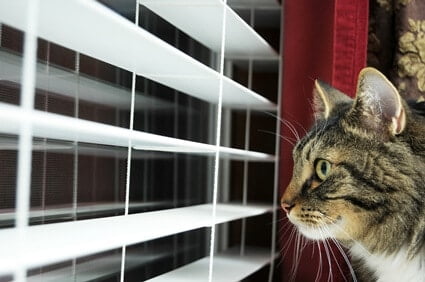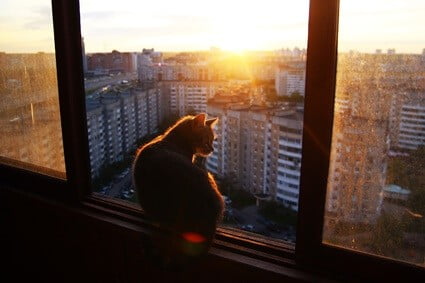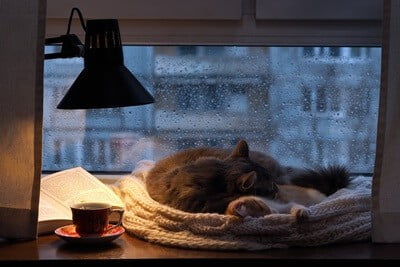Cats can pass countless happy hours staring out of windows. Usually, though, the activity is reserved for the daytime. During daylight hours, cats can watch people, and other animals go about their business.
A cat watching the window at night may lack routine or be awake through insufficient exercise. It is hoping to be entertained by what it sees. The cat may be guarding your home – and, by extension, its territory – or contemplating hunting opportunities. The cat may be in heat, hoping for a nocturnal visitor. A senior cat may be going senile.
A cat looking out of the window at night is rarely a problem. If the cat does so silently, leave it to happily amuse itself. If the cat grows overstimulated and keeps you awake, you need to find out what is causing this excitement.
Why Do Cats Stare Out Windows?
Windows are an endless source of entertainment for felines. The Journal of Feline Medicine and Surgery refers to windows as essential lifestyle enrichment. A look out of the window after dark differs from daylight hours, though.
It is a common misconception that cats are nocturnal. Felines are crepuscular, meaning most active at dawn and dusk. This means your cat may look out of the window as you wake. The cat is seeking the stimulation accompanied by daybreak.
Some cats will stare out of the window all night. In theory, this is a harmless habit. It could suggest that something is missing from your cat’s routine, though. A cat may also grow overstimulated by what it sees, hears, or smells, waking you.
In an ideal world, your cat will keep to your schedule and sleep when you do. This way, the cat is unlikely to keep you awake. Try to assert why your cat looks out of the window at night. You can then decide whether action is necessary.

Routine
Your cat may be staring out of the window after dark as it lacks routine. Cats can spend hours looking out of windows. Usually, this is a way to pass the time when there is little else to do. Many cats watch the world go by while owners are at work, for example.
If your cat keeps these hours by night, it may lack routine and structure to its day. This can be dangerous for felines, who like to know when they’ll be fed or played with. Lack of routine can cause stress and anxiety in cats.
Erratic comings and goings may also explain why your cat looks out the window. If you have teenage children, for example, they may come home late. The cat is looking out for them.
The cat may also be seeking a family member that works shifts. It is waiting for signs of arrival, like car doors closing or footsteps. In these instances, the cat has built nocturnal window-watching into its routine.
This is not a problem unless your cat grows excitable. The cat may start to grow agitated by what it sees or doesn’t see. In such cases, you’ll need to break this habit to avoid disturbing verbalizations.
This is easy to achieve. Pull the blinds or close the drapes. The cat will soon grow bored by the lack of stimulation. Just be aware that this means the cat will seek entertainment elsewhere. These activities may not be as peaceful as looking out of the window.
Insufficient Exercise
Cats spend a lot of time asleep. When a cat is awake, it will be filled with energy. This will need to be directed somewhere. As a result, the cat will look for stimulation.
If your cat was not exercised enough during the day, it will be restless by night. Looking out of the window is a seemingly harmless side-effect. The cat will grow weary of this activity after a while, though. It will want to explore outside or will wake you for entertainment.
Bring a lengthy playtime before bedtime in your cat’s routine. Coupled with an evening meal, this will leave the cat exhausted. This will see the cat happily sleeping through the night, saving window-watching for daylight hours.
Sounds
It is a myth that cats have perfect night vision. Cats cannot see in pitch darkness. They have vastly superior night vision to humans, though. Dim illumination, such as streetlamps or the moon, provides a cat with enough light to see.
This means that your cat will explore any sounds it hears by night. This could be garbage collectors working unsocial hours. It could be people walking after dark or car doors opening and closing. It could even be your neighbors holding a conversation after hours.
Sound will pique a cat’s excellent sense of hearing, and it will want to investigate. Most of the time, a cat will stop watching once its curiosity is satisfied. If the cat cannot locate the source of the noise, it will keep staring.
Hunting Instinct
If your cat is awake and alert, its hunting instincts will remain sharp. What’s more, many cats love to hunt and patrol at night. With less road traffic and footfall, cats find it easier to hunt using sound and scent.
Most birds are diurnal, meaning they sleep by night. Most birds active after dark are dangerous to cats, such as owls. Other prey, such as mice and rodents, may be active at night. Your cat will stare out of the window as it hears or scents this possible prey.
Your cat will grow frustrated by sensing prey it is unable to access. The behavior must be handled the same way as a cat chirping at birds by day. Better yet, play hunting games with your cat before bed. This will sate predatory instincts until morning.
Keeping Guard
Some cats will act as a night watchman, staring out of the window to deter visitors. In theory, this is flattering. It suggests that the cat is looking to protect its human family. While this is true to an extent, the cat is also protecting its own interests.
Cats work long and hard to establish a territory of their own. As explained by the Canadian Journal of Zoology, this will typically involve scratching and urine marking. Your cat will have marked your property to deter rivals.
This may not prevent other cats from visiting, though. Feral or stray cats, in particular, will be interested. These felines are always looking for potential food or shelter. If they have reason to believe they will find it on your property, they will investigate.
This will not escape your cat’s attention. It will stand guard, looking to deter these infiltrators. This can become problematic. The cat may be safe indoors, but it will still grow stimulated. This can lead to untapped aggression that is taken out on you.
Usually, strange cats will lose interest in your property if not encouraged. A combination of warnings from your own pet and disinterest from you will do the trick. Do not allow your cat to confront visitors face to face, though. It will likely end in dangerous conflict.

Estrus Cycle
Your cat may have amorous intentions rather than aggression. If a female cat is not spayed, she will enter heat multiple times a year. The estrus cycle does not have a body clock. Your cat will be looking to mate 24/7.
This can be particularly prevalent after dark. If your cat knows that other felines patrol at night, she will look for them. If she spots a potential mate, caterwauling will begin. The cat is announcing that she is available for breeding. This is frustrating but must be lived with.
The same will apply to an intact tomcat all year round. Unless neutered, male cats are always looking to mate. If your cat scents intact females in the area, it will watch intently for any sign.
Cognitive Decline
If your cat is far into its senior years, it may be experiencing cognitive decline. This is essentially feline senility. Just like vision and hearing, a cat’s brain starts to deteriorate with old age. Cognitive decline typically becomes more pronounced after the age of 15.
Veterinary Clinics: Small Animal Practice explains that a reversed sleep-waking cycle is a common sign of cognitive decline. Your cat may spend all day dozing, then conduct traditional daytime activities after dark. It may also become distressed and vocal.
While cognitive decline is as inevitable as it is incurable, it can be slowed down. You’ll need to be patient. Retrain your cat, acknowledging that its ability to retain memory will be compromised. The more you stimulate your cat’s mind, the more like its old self it will be.
Cats stare out of the window at night for numerous reasons. Oftentimes, it’s perfectly harmless behavior. Do be prepared to step in and cease the activity if necessary, though. An overexcited cat is the last thing anybody wants after dark.


My cat usually runs to my window in the bedroom when I leave it open at night but the last few nights he has stopped? His eyes today were odd while laying down on the bed. They seemed to flexed. I hope he is not in pain or something?